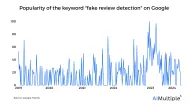Top 5 Sentiment Analysis Benefits for Businesses in 2024
Trust is one of the most important factors in the success of companies, but it is not always easy to establish. It requires businesses to understand their customers and act accordingly. Thanks to emerging technologies such as sentiment analysis, businesses can differentiate and categorize users’ emotions about their brand or products and services.
In this article, we’ll explore five benefits of conducting sentiment analysis for businesses.
1. Infer meaning from unstructured data
With the increasing number of customers, customer feedback will reach an amount that cannot be analyzed manually. It is estimated that by 2025, 80% of all data will be unstructured, meaning that companies trying to make sense of unstructured data will face many challenges.
Sentiment analysis is carried out by machine learning or deep learning algorithms, so the data gathered from customers are categorically organized by their emotional tone as positive, negative, or neutral, and by their extent. Thus, it gets easier to understand what your data tells about your customers, and companies that switch to this technology face much less difficulty while analyzing customers’ data.
2. Take quick action against poor customer experience
Figure 1. An example of an action taken by Amazon Customer Services


Providing a great customer experience is crucial if you want to stand out from the competitors and want your business to succeed. So, when your customers have an unpleasant experience and they report it, you should act upon it immediately. Thanks to sentiment analysis, a massive amount of customer data can be examined and categorized by the emotional content, and the negative ones can be highlighted. Thus, the companies can take necessary action before they lose their customers.
3. Boost business performance and strategy
By analyzing the emotional tone in the reviews of customers, you can identify the most liked and disliked products or services; thus, you can change your business strategy for the most disliked ones. Or, if your company sells products and uses product recommendation systems, you can understand customers’ needs better and provide better recommendations.
A study shows that when the recommendations are made considering the sentiment intensity, user satisfaction reaches 91%, but the random suggestions only achieved 65% customer satisfaction. So by conducting sentiment analysis, you can develop better strategies for the most disliked services or products and satisfy your customers with more relevant recommendations to their emotional states.
4. Develop empathetic chatbots
Figure 2. How AI Chatbots help your business thrive?

People who have poor consumer experience want their problems to be seen and heard. By conducting sentiment analysis, companies can develop chatbot systems that are more empathetic towards the customers’ feelings. This way, chatbots can be perceived as much more human-like, and that positively impacts the company.
5. Reduce customer churn
The 2022 CRM Impact Report shows an average customer churn rate of 32% globally. The same report also highlights that 83% of marketing managers think these rates are due to their inability to establish solid communication with customers and irrelevant messaging.
Sentiment analysis helps companies communicate better with customers and develop more relevant messages. By identifying the users’ emotions, you can get a better idea of their experience and provide better customer service, which eventually leads to a decrease in customer churn.
Further reading
If you are interested in learning more about sentiment analysis, you can read our other articles:
- Sentiment Analysis: How It Works & Best Practices
- Top 4 Real-Life Examples of Sentiment Analysis
- Top 5 Open Source Sentiment Analysis Tools
Feel free to check our data-driven list of sentiment analysis services if you think your company can benefit from sentiment analysis.
If you have questions about sentiment analysis, you can reach us:

Cem has been the principal analyst at AIMultiple since 2017. AIMultiple informs hundreds of thousands of businesses (as per similarWeb) including 60% of Fortune 500 every month.
Cem's work has been cited by leading global publications including Business Insider, Forbes, Washington Post, global firms like Deloitte, HPE, NGOs like World Economic Forum and supranational organizations like European Commission. You can see more reputable companies and media that referenced AIMultiple.
Throughout his career, Cem served as a tech consultant, tech buyer and tech entrepreneur. He advised businesses on their enterprise software, automation, cloud, AI / ML and other technology related decisions at McKinsey & Company and Altman Solon for more than a decade. He also published a McKinsey report on digitalization.
He led technology strategy and procurement of a telco while reporting to the CEO. He has also led commercial growth of deep tech company Hypatos that reached a 7 digit annual recurring revenue and a 9 digit valuation from 0 within 2 years. Cem's work in Hypatos was covered by leading technology publications like TechCrunch and Business Insider.
Cem regularly speaks at international technology conferences. He graduated from Bogazici University as a computer engineer and holds an MBA from Columbia Business School.
To stay up-to-date on B2B tech & accelerate your enterprise:
Follow on
Comments
Your email address will not be published. All fields are required.